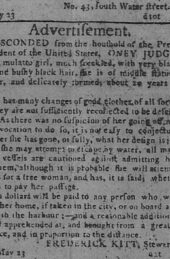Suzette D Harrison, many congratulations on your new novel, My Name Is Ona Judge. It’s based on the experience of Ona Judge, enslaved to the Washington family. How did you find out about her?
I’ve a passion for African American History, so much so that my undergraduate degree is in Black Studies. One thing that propelled me in this direction was because African American History wasn’t part of the standard curriculum when I was growing up. In fact, I didn’t have a Black History class until my senior year in high school, and it was only taught the first semester! As if there wasn’t enough content for a full year. Or as if it was an afterthought and concession. That said, I’d heard of Ona Judge after college, but it was a more recent conversation that brought her fully to my attention…and my writer’s imagination. I was fascinated by her story, her courage, and decision to take her own life into her young hands despite the perils of freedom’s voyage.
She was an extraordinary person, and was interviewed later on in her life, but why did she run away as a young woman?
Perhaps, a better question is why would she remain enslaved? Slavery was a heinous institution built upon the backs and bodies of persons treated as and deemed to be subhuman. Ona was often plagued by the Washingtons’ oldest granddaughter, Eliza Custis, who was mercurial in temperament. When Ona learned that she was to be “gifted” to Eliza Custis upon her marriage, Ona determined within herself not to allow that to happen. She refused to be the property of this woman who often treated her despicably. She had no means by which to purchase her freedom. Her only recourse was escape.
What kind of character do you think she was?
Ona was only twenty-two at the time of her escape from the household of the most powerful persons in the United States. I’d say she was daring. Quiet. Tenacious. Intelligent. Determined. Resilient. But most of all brave.
Her escape caused advertisements to be run in Philadelphia newspapers, advertisements that are very strange to read now. But George Washington left his pursuit at that, and did not go down a legal route. Does that betray his awareness of the serious moral questions over slavery?
Actually, Washington did pursue Ona. Not once. But twice! He did so quietly so as not to incite public scorn, particularly from the Abolitionist movement. And he didn’t do so himself, directly. He enlisted the aid of other individuals, Joseph Whipple (a customs collector) and Burwell Bassett (nephew of Mrs. Washington). The former attempted to reason with Ona, to persuade her to return to slavery and failed. The latter was prepared to use physical force if necessary, but Ona was alerted to his intent and managed to evade Bassett. Was Washington morally conflicted over the issue of slavery? Perhaps. That doesn’t erase the fact that he owned humans.
George Washington had many great achievements to his name, not least defeating the British, first President. How do you think his ownership of slaves affects his reputation?
I doubt that it does. He will always be venerated as the great General who became the nation’s first elected leader. Many still honor and celebrate him. Many may or may not be aware that he enslaved human beings. I take nothing away from his successes. I can acknowledge his accomplishments without turning a blind eye to the fact that he was master of a plantation on which persons of African descent were held in captivity. The enforced bondage of persons at Mount Vernon shouldn’t be overlooked, denied, or dismissed. Without question, it happened.
For the first part of his life, Washington appears to have been comfortable with his own slave-holding (e.g. he would personally strike slaves), but during and after the War of Independence, there seems to be a change, and he does free those slaves he owned on his death. Does this lessen the burden on his reputation, in contrast to Thomas Jefferson?
This question seems to restate the prior two with slight variation, shifting the focus from this incredible young woman to George Washington. As a novelist of African American History, and one who has written the story of Ona Judge, my concern and focus isn’t the first President and his reputation. Certainly, he is a powerful and important figure. That’s not a matter of dispute. But placing him and any burden on his reputation at the center of the narrative is to repeat a familiar pattern where the dominant remain at the forefront while persons who have suffered in their shadows are further obfuscated. Yes, President Washington freed his enslaved bondsmen upon his death. Was that because of a shift in moral conscience? Or because he, in light of his being dead, had no further need of them?
What is Ona Judge’s legacy today?
While children’s books and those of an academic nature have been written about her, Ona Maria Judge still remains a rather obscure figure.My hope is that this novel will provide a safe place and space of insight, celebration, and discovery of who she was. She was a remarkable individual who deserves our focus and attention.
What’s next for you?
I’m currently working on a coming-of-age story set in the 1940s featuring a young girl living a nomadic life due to her mother’s mental illness and the circumstances of her own birth. The novel will deal with racism, segregation, mental illness, family secrets, and passing. Anyone unfamiliar with the phenomenon of “passing,” be ready for some explosions.
Thank you Aspects of History for graciously allowing this discussion!
Suzette D Harrison is the author of My Name Is Ona Judge, published by Bookouture.






